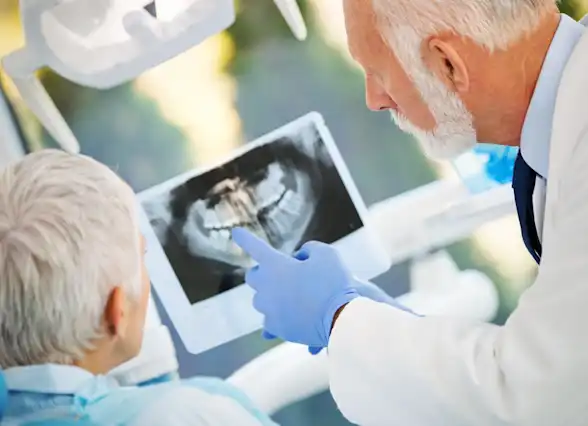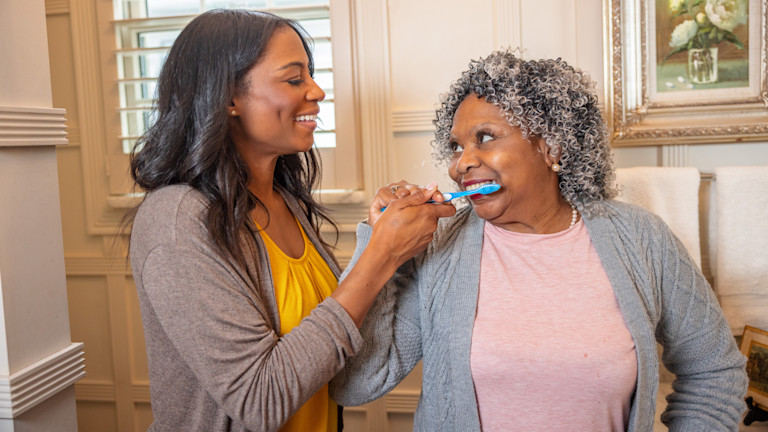The Unknown Importance of Dental Exams
Poor oral care can lead to infection, chewing/swallowing problems, even heart, lung, and brain diseases, and inability to enjoy our favorite foods!
Get insurance benefits, legal documents, and medical records in one place

Helpful Highlights
Oral health encompasses much more than teeth and affects many things that we don't think about being connected to oral health.
Many older adults ignore signs and symptoms of poor oral health, and caregivers don't think to look or ask.
Dentists are trained to evaluate all existing and potential oral health complications and make referrals to other specialists as needed.
Oral conditions and systemic problems are interrelated. Therefore, routine dental exams are imperative for early identification and intervention.

You should be seeing a dentist at least once a year, preferably twice (every 6 months).
Proper dental care is about much more than teeth, though clean and healthy teeth are an essential start. Many people don't realize that issues with the teeth and gums lead to far greater problems than what is seen or felt on the surface, and more can go wrong with the mouth and jaw than just tooth decay. Advanced oral health issues can cause serious problems throughout the body.
Caregivers who assist frail elders in carrying out activities of daily living should be educated and trained in providing oral care, especially those who care for elders living in nursing homes.
Some facts
Older adults should still brush and floss daily!
Adults aged 50 years and older who smoke are less likely to get dental care than people who do not smoke.
People with chronic diseases may be more likely to develop gum (periodontal) disease, but they are less likely to get dental care than adults without chronic conditions.
Potential physical, sensory, and cognitive impairments associated with aging may make home oral health care and education challenging.
Older adults may have increased sensitivity to drugs used in dentistry, including local anesthetics and analgesics.
Regular dental exams detect oral health problems in older adults
Dry mouth (xerostomia). Dry mouth is caused by reduced saliva flow, which happens gradually as we get old, though is made worse by chronic conditions and multiple medications. Dry mouth affects 30% of people 65 years and older and up to 40% of people 80 years and older. Preventing dry mouth is essential in avoiding multiple oral health problems:
foul breath (halitosis)
mucositis (inflamed soft tissues of the mouth)
gingivitis (inflamed gums) and gum recession
tooth and root decay
cracked lips and tongue
altered sense of taste
thrush or other infections
difficulty speaking, eating, or swallowing
Gum disease (periodontitis). Gingivitis can lead to gum disease, which is why gingivitis should not be ignored. 2 out of 3 adults aged 65 or older have gum disease. It is not only an oral health threat, it is also a risk factor for both heart and lung disease.
Darkened teeth. Sometimes darkened teeth are caused by changes in the bone-like tissue under the tooth enamel (dentin), and because thinning enamel lets the darker yellow dentin show through. These are backed by a lifetime of consuming foods and beverages that stain enamel. Darkened teeth, however, may be a sign of a more serious problem - like loss of blood flow - and should be checked by a dentist.
Tooth decay (caries or cavities). 1 in 5 adults aged 65 or older has untreated tooth decay (cavities, or worse). Cavities oftentimes go unnoticed until they are advanced. Cavities do not resolve on their own, and at advanced stages can cause problems in deeper tissues and structures. Tooth decay, just as with any other condition, is best addressed early. Once tooth pain is felt, drilling and filling are a certainty, though more may be required depending on the extent of the decay and damage.
Root decay (caries). The same decay that happens to tooth enamel can happen to the root of the tooth. Root decay can lead to the need for a root canal, as well as cause infection and breakdown of surrounding tissues - including the bone.
Tooth loss. Nearly 1 in 5 adults aged 65 or older have lost all of their teeth. Complete tooth loss is twice as prevalent among adults aged 75 and older. Broken or missing teeth are a gateway to the tissues, vessels, nerves, and bone beneath. These are direct pathways to the ears, throat, heart, and brain. Therefore, if an infection occurs beneath the teeth, it could travel to any of those locations and cause hearing loss, problems swallowing, heart disease, and even irreversible angina (chest pain caused by reduced blood flow to the heart).
Uneven jaw bone. This is caused by broken or missing teeth that are not replaced, allowing the remaining teeth to drift and shift into open spaces, resulting in a crooked bite and eventually an uneven jaw. An uneven jaw can cause considerable discomfort or pain in the jaw, ears, and neck, as well as trigger headaches. It also causes problems with chewing and speaking and frequently leads to further dental damage.
Denture-induced stomatitis. This is inflammation of the tissue underlying dentures caused by ill-fitting dentures. It is often coupled with poor dental hygiene or a buildup of the fungus Candida albicans. It can be very painful, prevent eating and speaking, and lead to more serious oral health problems.
Thrush. Thrush is an overgrowth of the fungus Candida albicans. Thrush can cause great discomfort in the mouth, and make eating and drinking difficult. Untreated thrush can spread infection to other parts of the body, namely the lungs, liver, and skin.
Oral cancer. Cancers of the mouth are primarily diagnosed in older adults (median age at diagnosis is 62 years). Older adults also suffer a higher risk of oral cancer because of their thinner, weakened oral mucosa (the moist, pink tissues lining the mouth and teeth).
Dental problems can also affect speech, which can be frustrating and upsetting, as being understood is an important part of quality of life.
Effects on eating
Poor oral health, especially decayed, broken, or missing teeth can cause difficulties with chewing or swallowing, leading to poor nutrition and aspiration risk (liquids or foods pass into the lungs).
And probably most important... Poor dental care can prevent people from enjoying their favorite foods. It takes healthy teeth and gums to chew and break down meats, fibrous foods (most fruits and vegetables), and crunchy snacks.
Oral changes
If you or your loved one is having problems, do not wait to go to the dentist. Get checked if any of these symptoms persist for 2 weeks or more.
A spot in the mouth, on the lip, or in the throat that feels uncomfortable or sore
A lump or thick area in the mouth, on the lip, or in the throat
A white or red patch in the mouth
Trouble chewing, swallowing, or moving the jaw or tongue
Numbness in the tongue or mouth
Swelling in the jaw
Pain in one ear without hearing loss
You or your loved one should be seeing a dentist at least once a year, preferably twice (every 6 months).
RESOURCES
American Dental Association (ADA)
Health in Aging (*contains a great list of DON'Ts and DOs)
Leung, K. C-M., & Chu, C-H. (2023). Dental care for older adults. International Journal of Environmental Research and Public Health, 20(1), 214. doi: 10.3390/ijerph20010214
US DHHS Office of Disease Prevention and Health Promotion (OASH)
No content in this app, regardless of date, should ever be used as a substitute for direct medical advice from your doctor or other qualified clinician.
Get more support and guidance on insurance benefits, medical records and legal forms.
Helpful brings together your insurance benefits, legal documents, and medical records in one personalized place — so you always know what you have, and never have to search again.

Technology for Health Tasks. Mental Health for the Tough Stuff.
Helpful connects your medical records, insurance, and caregiving tasks automatically. And when you need more than logistics, a therapist is here to guide you.
In-Network and Covered
For Individuals, Couples and Families
HIPAA Compliant, Data Stays Private


Healthcare Tasks Simplified

From syncing records to spotting drug interactions, Helpful does the heavy lifting, turning complex health info into clear tasks and showing you benefits you can actually use, giving you clarity and control over your care.

In-Network Mental Health

Our licensed therapists are here to support you and your loved ones through stress, burnout, and life’s hardest moments, with an inclusive, compassionate approach that works with most insurance plans.

Create Legal Documents

Plan ahead by creating will, trusts, advance directives and more, that ensure your wishes are honored in the event you can’t speak for yourself -with Helpful guiding you every step of the way.